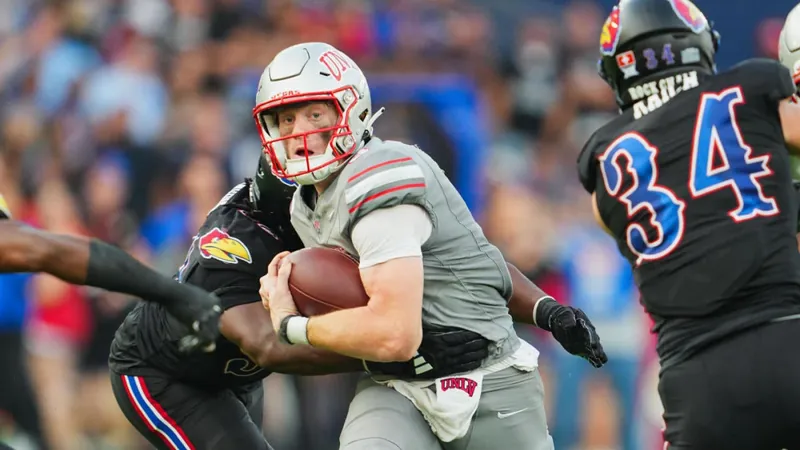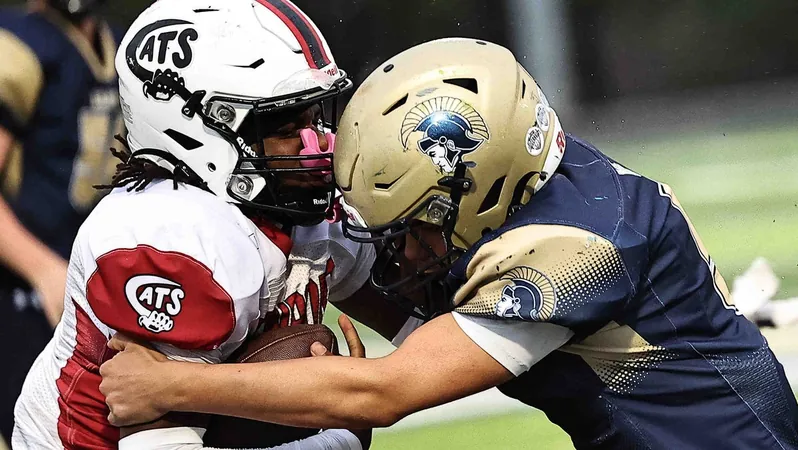
Shocking Exit: UNLV’s Star QB Matthew Sluka Quits Over NIL Dispute – What This Means for College Football!
2024-09-25
In a startling move that has sent ripples through the college football landscape, starting quarterback Matthew Sluka has left the UNLV football program just three games into a promising season. This decision comes amid controversy surrounding unfulfilled NIL (Name, Image, Likeness) commitments, thrusting the issue into the national spotlight and raising concerns about the integrity of recruitment in college athletics.
UNLV head coach Barry Odom expressed his disbelief over Sluka's departure, highlighting the player's perceived market value and the expectations set before his arrival. Sluka, a recent transfer from Holy Cross, was initially viewed as a crucial asset to a Rebels team that was enjoying its first-ever ranking and had aspirations for the College Football Playoff.
According to multiple sources, including ESPN and CBS Sports, Sluka allegedly was promised a minimum of $100,000 from UNLV's NIL collective, a claim that has since been disputed by school officials. Rob Sine, the CEO of Blueprint Sports, confirmed that no such agreement was in writing and clarified that Sluka only received a modest stipend from the university. This has sparked allegations of mismanagement and poor communication within the framework of college athlete compensation.
In a statement, UNLV underscored its commitment to compliance with NCAA regulations, suggesting that demands from Sluka's representatives represented a breach of pay-for-play rules. They emphasized the importance of contracts in these agreements, noting that there was no formal arrangement concerning Sluka's potential earnings.
The fallout from this incident illuminates a growing trend in college football, where player exits over NIL disputes threaten team cohesion and success. Sluka's case is not an isolated one; similar scenarios have unfolded as athletes begin to navigate their value in this new landscape of collegiate athletics increasingly driven by financial incentives.
Interestingly, Sluka's decision to leave just prior to completing four games allows him to preserve his redshirt status, meaning he can transfer without losing a year of eligibility. His actions mirror previous high-profile situations, including former Houston quarterback D'Eriq King, who paused his season midyear to protect his eligibility.
UNLV's unique position—with its 3-0 start and aspirations for a significant postseason run—exemplifies the precarious balance of fostering talent while managing financial expectations. The Rebels recently lost another quarterback to transfer and now face the challenge of rebuilding yet again.
The broader implications of this situation hint at a potential shift in the college sports landscape towards a more business-oriented model, with players increasingly wielding power over their careers and negotiating terms regarding their on-field performance. As the NCAA grapples with the consequences of unregulated NIL deals, the urgency for a standardized approach grows.
With Sluka's departure, the question looms—what precedent does this set for other athletes seeking their worth amid rising tension in the college sports arena? Could we witness more players opting out midseason in search of better deals, or will programs adapt to meet rising expectations?
As this story continues to develop, one thing is clear: the landscape of college football is changing rapidly, and the stakes have never been higher.
Stay tuned as we follow the repercussions of this unfolding saga!


 Brasil (PT)
Brasil (PT)
 Canada (EN)
Canada (EN)
 Chile (ES)
Chile (ES)
 España (ES)
España (ES)
 France (FR)
France (FR)
 Hong Kong (EN)
Hong Kong (EN)
 Italia (IT)
Italia (IT)
 日本 (JA)
日本 (JA)
 Magyarország (HU)
Magyarország (HU)
 Norge (NO)
Norge (NO)
 Polska (PL)
Polska (PL)
 Schweiz (DE)
Schweiz (DE)
 Singapore (EN)
Singapore (EN)
 Sverige (SV)
Sverige (SV)
 Suomi (FI)
Suomi (FI)
 Türkiye (TR)
Türkiye (TR)